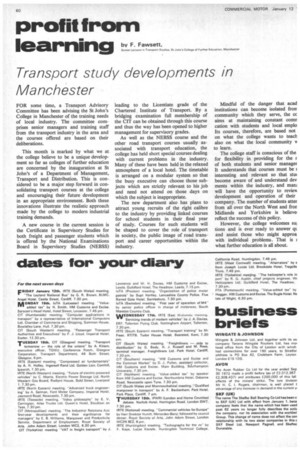profit from learning
Page 62

If you've noticed an error in this article please click here to report it so we can fix it.
by F. Fawsett,
Transport study developments in Manchester
FOR some time, a Transport Advisory Committee has been advising the St John's College in Manchester of the training needs of local industry. The committee comprises senior managers and training staff from the transport industry in the area and the courses offered are based on their deliberations.
This month is marked by what we at the college believe to be a unique development so far as colleges of further education are concerned by the inauguration at St John's of a Department of Management, Transport and Distribution. This is considered to be a major step forward in consolidating transport courses at the college and encouraging their future development in an appropriate environment. Both these innovations illustrate the realistic approach made by the college to modern industrial training demands.
A new course in the current session is the Certificate in Supervisory Studies for both freight and passenger students which is offered by the National Examinations Board in Supervisory Studies (NEBSS) leading to the Licentiate grade of the Chartered Institute of Transport. By a bridging examination full membership of the CIT can be obtained through this course and thus the way has been opened to higher management for supervisory grades.
As well as the NEBSS course and the other road transport courses usually associated with transport education, the college has held short special courses dealing with current problems in the industry. Many of these have been held in the relaxed atmosphere of a local hotel. The timetable is arranged on a modular system so that the busy executive can choose those subjects which are strictly relevant to his job and need not attend on those days on which the subject is inappropriate.
The new department also has plans to attract young recruits of the right calibre to the industry by providing linked courses for school students in their final year of study. Courses for such students will be shaped to cover the role of transport in society, the public image of road transport and career opportunities within the industry. Mindful of the danger that acad institutions can become isolated frorr community which they serve, the cc aims at maintaining constant comn cation with students and local emplo Its courses, therefore, are based not on what the college wants to teach also on what the local community v to learn.
The college staff is conscious of the for flexibility in providing for the r of both students and senior manager It understands that courses must be interesting and relevant so that stu■ become aware of and understand dev ments within the industry, and man; will have the opportunity to review development and operation of their company. The number of students atter from all over the North West and fror Midlands and Yorkshire is believe, reflect the success of this policy.
However, the college welcomes su; tions and is ever ready to answer qt and assist those who might approa with individual problems. That is what further education is all about.








































































































